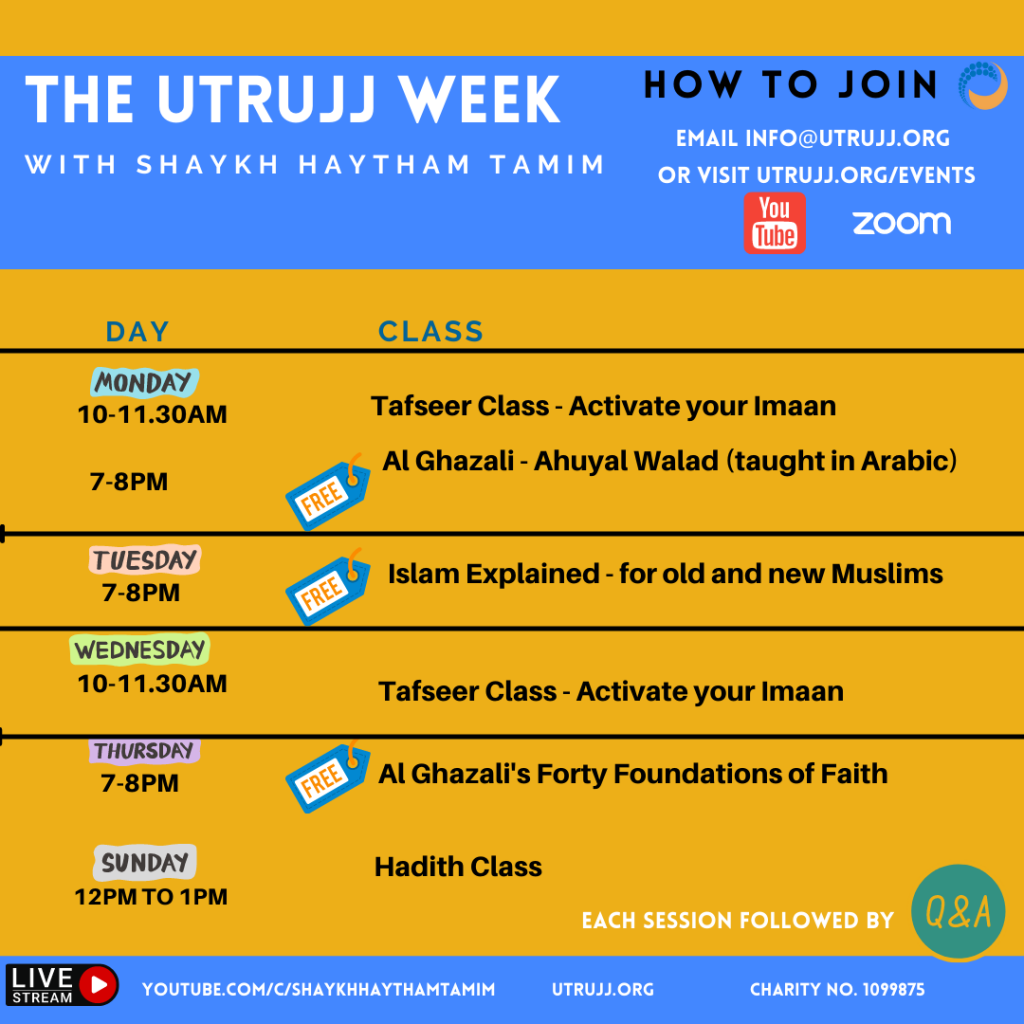Ghazali – If you had just one day to live, what would you do?

Munazarat an Nafs – debating with yourself
The Forty Principles of the Faith ends with a debate between Ghazali and himself, and he recommends that we do this as well – rather than debating with others, try to convince yourself of the truth, as you try to convince your opponent. Scholars of tasawwuf (self purification) used to do this regularly.
Ghazali says that having read all the preceding chapters, we should be able to reap the fruits of the lessons now. However there are steps we have to take, for instance you have to strive to empty your heart after every Fajr prayer and empty your mind, think about your life and your afterlife. Take yourself to account – checking your files, deeds, actions and intentions. Then tell yourself you are traveller doing business. Your profit will be everlasting bliss and meeting Allah. Your loss would be everlasting misery and to be veiled from Allah. Your capital is your life – every breath you take is a treasure. Through his you attain everlasting happiness. There is no treasure better than this. If your life ended, your trade would stop. Every day is a new opportunity to make profit.
Every day is a new day
Tell yourself – today is a new day. Allah has given you another chance to do business with him and make profit. What will you do with this opportunity? If you died, you would long to come back, as Allah showed us in the Quran. Pre-empt this and imagine that you died and Allah gave you the chance to come back for one day, what would you do?
What if you had just one day?
Once, I asked the audience to write a plan for 1 month to live, so they did. Then I said ‘Imagine if you had just 1 week’, and so they reduced their list; and then I said, ‘Imagine if you had just one day’. As they imagined their time shrink, their priorities changed. What they considered important, became less important when they had less time. Their priorities became apparent.
If you had just one day, and you had been to the akhirah and come back, you would strive towards maximising the benefits of that day. You know you won’t be given another day. You would pray with khushoo, you would make dua for purity and your akhirah, if you had any quarrels, you would sort them out and seek forgiveness, if you had borrowed anything, you would return it. You would give charity. You would do your best not to have any regrets.
Focus on the priorities. You would exhaust your efforts to do the best you could do. Ghazali says live every day like this day. Then you won’t have regrets. You won’t wish you had asked people for forgiveness as you would have already done it. Don’t fool yourself that Allah will forgive you. This is false hope. If you have a regret during your life, you can fix it, but if you have a regret when you’ve died, you can’t change anything.
Aim for higher ranks
Even if Allah does forgive you, why lose out on the opportunity to be al muhsineen, the ones who strived for excellence. Why accept the ground floor, when you can aim for the penthouse? What is stopping you from reaching a higher level? When you arrive in the akhirah you will wonder why you did not exert yourself more. Avoid this scenario by telling yourself to leave everything that will leave you after death. Seek Allah and increase your remembrance of Him. You will ask yourself, ‘How do I leave the dunya which is residing in my heart?’ Tell yourself to cut out any distractions that keep you away from Allah.
Imam Ghazali mentioned 10 bad traits which we need to rid ourselves of. So examine yourself for these – for instance, loving wealth or status or having grudges or being controlled by desires, as these traits can destroy you. Then roll up your sleeves and begin rooting them out, and you can do this with Allah’s support and grace.
Imagine you have a chronic disease which will be with you until you die and the doctor prescribed medicine which you have to take every day at different times. You would take it, even though it is bitter, because you want to have a better quality of life. You will put up with it, because you know it is beneficial, even though you do not like it.
Tell yourself when you are on a long journey with plenty of stations and difficulties along the way, you keep persevering because you know you are going home and you will see your family and get rest. Similarly, in our journey to Allah, we need to have patience and trust and know that His prescription and instructions, which we have received through the revelation, are for our benefit. The prescription will help us and we have to practice patience.
Ask yourself what you are seeking in this life. If you are seeking wealth, no matter how much wealth you get, there will always be people with more wealth than you. If you want status, no matter what position you reach, there will always be someone better than you.
If you cannot excise the distractions of dunya then they will drag you down. On the other hand if you are able to renounce the dunya and uproot it from your heart, and focus fully on the akhirah then you will reach a level that many can’t reach.
If you are seeking for a high level in the akhirah, that is the best aim. Ghazali says do not be a fool and compete in the dunya like a donkey. Keep giving yourself this pep talk, until you convince yourself to follow the right path, which pleases Allah.
Engaging in the debate that matters
Ghazali was known as Hujut Islam (the Proof of Islam) as he was a master at debating, yet he said debating with yourself is much more fruitful than debating with others, in matters like different schools of thought. Even if another school holds a different opinion it does not matter, because they may refuse to accept your argument, even if you are right.
The real enemy is within you, so it insane to debate with others, when you have to fight your own nafs. If you are not fighting your nafs, but feeding your desires, you are making things worse for yourself, not better. Your nafs will argue with you to circumvent the rules, and follow your desires. Do not let your nafs do this to you.
Have you ever seen somebody who has snakes and scorpions under his dress, but when they come to bite him, instead of removing them, he takes out a fan and tries to get rid of the flies from others’ faces? Ghazali says the one who does this is heading in the wrong direction and not facing their reality. This is escapism or burying your head in the sand.
Getting a grip of your nafs
When you face yourself, you will be able to see the core of your action – is it real or lifeless? You will be able to see the spirit of your action. As he already warned us in previous chapters about the core of our actions. If we are not debating with yourself, your nafs will lead to your destruction. It will hinder you from having an intimate discourse with Allah or gaining closeness to Him.
When we perform salah, we do not eat or drink for about 5 minutes, but when we fast, we increase the time we exert self-control to 14 hours or more in Ramadan.
Allah is a time of intense training, teaching us how to control our desires. The more we control our desires, the more we can have control our destructive traits. In Ramadan, we learn how to become closer to Allah, in particular in the last ten nights when we can go into seclusion.
Punish yourself
The closer you are to your desires the further you are from Allah and vice versa. The way to treat to yourself when you are not obedient is to punish yourself. For instance, if you miss a salah, you can fast one day or pay £100 to charity – not a small amount. This is a deterrent for your nafs. Similarly, if every time you backbite, donate £50 to charity, or volunteer in the community or do 1000 istighfar etc. Identify the destructive traits which are preventing your progress and fix them one by one, according to which one is more of priority than the others. Ghazali elaborated on this further in his Ihya Ulum ad-Din in the lengthy chapter on self-observation, entitled Kitabul Muhasba wal Muraqaba. It contains more tools and techniques.
Ghazali asked Allah for tawfiq to be among those who spread goodness and improve their obedience and seek His generosity and grace. Ameen.
Shaykh Haytham Tamim – Thursday Hadith Class 9th March 2023
Related posts
Download your FREE Booklet on Birth and Death Rites in Islam
Download your FREE Booklet on Preparation for Death
What duas can you recite for a good death
Ghazali on contentment (part 1)
Is it OK to cry when someone passes away?
List of prophetic daily adkhar
GHAZALI ON LOVE (PART 2)
https://www.utrujj.org/ghazali-on-love/
[i] Hadith of Gabriel: Angel Jibril came to teach you Islam (abuaminaelias.com)
Umar ibn al-Khattab reported: We were sitting with the Messenger of Allah, peace and blessings be upon him, one day when a man appeared with very white clothes and very black hair. There were no signs of travel on him and we did not recognize him. He sat down in front of the Prophet and rested his knees by his knees and placed his hands on his thighs. The man said, “O Muhammad, tell me about Islam.” The Prophet said, “Islam is to testify there is no God but Allah and Muhammad is the Messenger of Allah, to establish prayer, to give charity, to fast the month of Ramadan, and to perform pilgrimage to the House if a way is possible.” The man said, “You have spoken truthfully.” We were surprised that he asked him and said he was truthful. He said, “Tell me about faith.” The Prophet said, “Faith is to believe in Allah, His angels, his Books, His Messengers, the Last Day, and to believe in providence, its good and its harm.” The man said, “You have spoken truthfully. Tell me about excellence.” The Prophet said, “Excellence is to worship Allah as if you see Him, for if you do not see Him, He surely sees you.” The man said, “Tell me about the final hour.” The Prophet said, “The one asked does not know more than the one asking.” The man said, “Tell me about its signs.” The Prophet said, “The slave girl will give birth to her mistress and you will see barefoot, naked, and dependent shepherds compete in the construction of tall buildings.” Then, the man returned and I remained. The Prophet said to me, “O Umar, do you know who he was?” I said, “Allah and his messenger know best.” The Prophet said, “Verily, he was Gabriel who came to teach you your religion.” [Muslim]
عن عُمَر بْن الْخَطَّابِ قَالَ بَيْنَمَا نَحْنُ عِنْدَ رَسُولِ اللَّهِ صَلَّى اللَّهُ عَلَيْهِ وَسَلَّمَ ذَاتَ يَوْمٍ إِذْ طَلَعَ عَلَيْنَا رَجُلٌ شَدِيدُ بَيَاضِ الثِّيَابِ شَدِيدُ سَوَادِ الشَّعَرِ لَا يُرَى عَلَيْهِ أَثَرُ السَّفَرِ وَلَا يَعْرِفُهُ مِنَّا أَحَدٌ حَتَّى جَلَسَ إِلَى النَّبِيِّ صَلَّى اللَّهُ عَلَيْهِ وَسَلَّمَ فَأَسْنَدَ رُكْبَتَيْهِ إِلَى رُكْبَتَيْهِ وَوَضَعَ كَفَّيْهِ عَلَى فَخِذَيْهِ وَقَالَ يَا مُحَمَّدُ أَخْبِرْنِي عَنْ الْإِسْلَامِ فَقَالَ رَسُولُ اللَّهِ صَلَّى اللَّهُ عَلَيْهِ وَسَلَّمَ الْإِسْلَامُ أَنْ تَشْهَدَ أَنْ لَا إِلَهَ إِلَّا اللَّهُ وَأَنَّ مُحَمَّدًا رَسُولُ اللَّهِ صَلَّى اللَّهُ عَلَيْهِ وَسَلَّمَ وَتُقِيمَ الصَّلَاةَ وَتُؤْتِيَ الزَّكَاةَ وَتَصُومَ رَمَضَانَ وَتَحُجَّ الْبَيْتَ إِنْ اسْتَطَعْتَ إِلَيْهِ سَبِيلًا قَالَ صَدَقْتَ قَالَ فَعَجِبْنَا لَهُ يَسْأَلُهُ وَيُصَدِّقُهُ قَالَ فَأَخْبِرْنِي عَنْ الْإِيمَانِ قَالَ أَنْ تُؤْمِنَ بِاللَّهِ وَمَلَائِكَتِهِ وَكُتُبِهِ وَرُسُلِهِ وَالْيَوْمِ الْآخِرِ وَتُؤْمِنَ بِالْقَدَرِ خَيْرِهِ وَشَرِّهِ قَالَ صَدَقْتَ قَالَ فَأَخْبِرْنِي عَنْ الْإِحْسَانِ قَالَ أَنْ تَعْبُدَ اللَّهَ كَأَنَّكَ تَرَاهُ فَإِنْ لَمْ تَكُنْ تَرَاهُ فَإِنَّهُ يَرَاكَ قَالَ فَأَخْبِرْنِي عَنْ السَّاعَةِ قَالَ مَا الْمَسْئُولُ عَنْهَا بِأَعْلَمَ مِنْ السَّائِلِ قَالَ فَأَخْبِرْنِي عَنْ أَمَارَتِهَا قَالَ أَنْ تَلِدَ الْأَمَةُ رَبَّتَهَا وَأَنْ تَرَى الْحُفَاةَ الْعُرَاةَ الْعَالَةَ رِعَاءَ الشَّاءِ يَتَطَاوَلُونَ فِي الْبُنْيَانِ قَالَ ثُمَّ انْطَلَقَ فَلَبِثْتُ مَلِيًّا ثُمَّ قَالَ لِي يَا عُمَرُ أَتَدْرِي مَنْ السَّائِلُ قُلْتُ اللَّهُ وَرَسُولُهُ أَعْلَمُ قَالَ فَإِنَّهُ جِبْرِيلُ أَتَاكُمْ يُعَلِّمُكُمْ دِينَكُمْ
Related posts
Ghazali on contentment (part 1)
7 traits of a successful believer
Ghazali on 6 levels of truthfulness
Ghazali on showing off (part 3)
Ghazali on showing off (part 1)
Ghazali on how much wealth is sufficient
Ghazali on breaking free from anger
Evils of the tongue 5 – praise
Evils of the tongue 4 – joking
Evils of the tongue 3 – arguing
Evils of the tongue 2- backbiting
The benefits of feeling hunger
Why is following the sunnah the key to success. Ghazali’s secrets part 1
What is wrong with excessive laughter?
Do you have to practice what you preach?
Self righteousness when giving counsel
Brotherhood, friendship and wilayah
How to deal with difficult neighbours
The first 6 rules of how to deal with people
How to deal with people according to their status (9-11)
Cover the faults of others (12-13)
Defend others in their absence, be tactful, be cautious of the company of the rich (16-18)

Recommended Posts

Don’t be a Ramadani person – Be a Rabbani person.
April 10, 2024

The test of will – Tarawih Reflections 30
April 09, 2024

